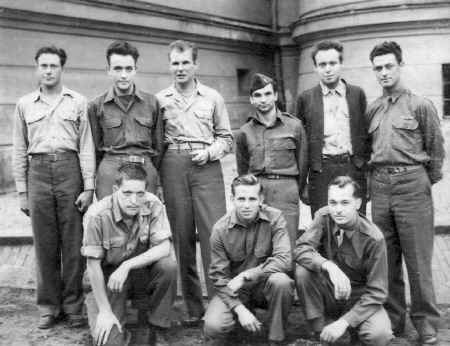Contents:
![]() Induction into the Army Air Corps
Induction into the Army Air Corps
![]() Grounded and wounded, but alive
Grounded and wounded, but alive
![]() The
German, the White Russian and me
The
German, the White Russian and me
![]() The Frankfurt
The Frankfurt
interrogation center
![]() Eat, drink, smoke, and be
Eat, drink, smoke, and be
creative
SURVIVING AND COPING
The survival rate in the camps was very good. I was under the protection of the English doctor in the camp hospital. The contact with the hospital would have let me know if there were a lot of deaths in the camp, but there were not.
The big thing the English doctor did was to circumcise the airmen. "You can't use it, so it's a good time for a trim," he'd say.
We had a library that was furnished by the YMCA. Before you checked out a book you looked at the last seven or eight pages to see if they were there. It was common practice to swipe the last several pages to be used as toilet paper. It was known as the "swipe a wipe" program.

Library
The YMCA also furnished band instruments. We had enough to make an orchestra. One of the happy moments was when they played Glenn Miller's version of the "American Patrol."
Boredom was quite heavy in the camp. Other than the two roll calls there was nothing to do. I was there during the winter months and the only thing to do was to play cards. There were whist and bridge games going on in every barrack. I got so tired of playing cards that I don't like to play cards to this day.
During the winter it was extremely cold. The stove was an immense porcelain tile-covered monster. Our 14 lumps of coal per day were not nearly enough to keep us warm and the barracks were not insulated. You slept in your clothes, and had only a single blanket.
We were allowed to shower once a week. There was one large room with multiple showerheads. Each man would select a position under a showerhead. The water would be turned on just long enough to get wet, and then the water was turned off. You then soaped for a brief period, and the water was turned on again just long enough to rinse.
We could see the Baltic could be seen from our barracks' windows. If we gave our word of honor that we would not try to escape, the German commandant told us, he would allow us to swim. About 35 or 40 of us agreed that we would not try to escape. We were marched to the sea accompanied by three guards. Everyone stripped and went swimming. When we were swimming, we saw a contingent of Russian women. It is not known whether they were prisoners or from the anti- aircraft school close by in Barth. But, there they were, swimming about 200-250 yards away. We couldn't mingle with them, but it would have been nice!
We always had mind problems. One of the prisoners had captured a fly. He put a long length of thread around the fly's body and cut off little bits of the thread until the weight of the thread was reduced to the weight that the fly could lift. Little things like this went on all the time.
I learned to play chess there without a chessboard or chessmen. The chessboard was numbered A-H across and 1-8 vertically. You moved your men from coordinate to coordinate remembering in your mind where each man was (yours and your opponent's) in your head. I never won a game, but we played a lot.
We received no mail, though we were allowed to write letters. They were at least picked up, but I don't know what happened to them after that. You always wondered what you would find at home when you returned.
My mother got a wire from the government that I was missing in action. She immediately went to the Red Cross, but they didn't know where I was or any thing else about me while I was in prison camp.
A ham radio operator from somewhere on the east coast of the United States wrote a letter to my mom telling her that I had been sent to a prison camp. That was the first information she had that I was alive. The only other communication she got about me was when the government sent her a wire that I was arriving at Staten Island on the Gripsholm on August 24, 1944.

Left to right in the back row: A.E. Drewhard, L.L. Purifoy, C.B. Fisher, Stew Cooper, J. Kennard, Jim Groves. Left to right in the front row: R.A. Lawrenz, Eugene Webb, Ed Moore.
